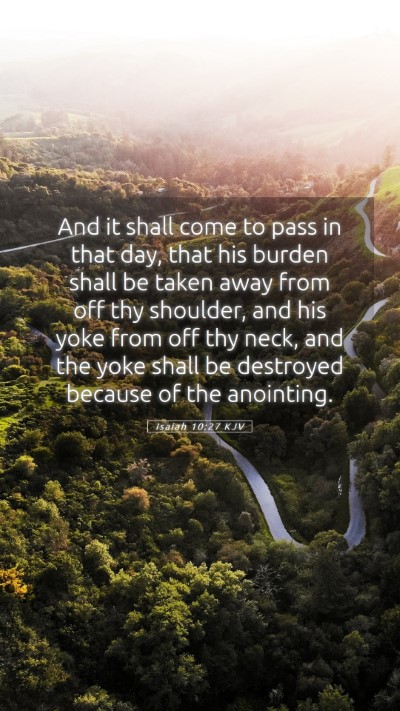Understanding Isaiah 10:27
Isaiah 10:27 states: "And it shall come to pass in that day, that his burden shall be taken away from off thy shoulder, and his yoke from off thy neck, and the yoke shall be destroyed because of the anointing." This verse conveys a profound promise of deliverance from oppression, illustrating God's intervention in the lives of His people.
Bible Verse Meanings
This verse signifies that the burdens imposed by oppressors will be removed, highlighting God's capability to liberate His people. The "yoke" symbolizes the heavy oppression of sin and tyranny, which God promises to break. Thus, this verse provides comfort and hope, reinforcing the themes of liberation and divine anointing.
Bible Verse Interpretations
Albert Barnes notes that the "day" referenced is a time when God's mercy would manifest, allowing His people to experience freedom. Matthew Henry emphasizes that the destruction of the yoke is due to the divine anointing, suggesting that Christ's coming acts as a catalyst for this liberation.
Bible Verse Understanding
Understanding Isaiah 10:27 involves recognizing the historical context of Israel's struggles under foreign oppression. Adam Clarke elaborates that the anointing represents the Holy Spirit's influence, underlining a key biblical truth: divine power is essential for true freedom.
Bible Verse Explanations
- Historical Context: This verse is situated in a time of significant turmoil for Israel, providing prophetic assurance of future deliverance.
- The Role of the Anointing: The anointing is significant in biblical tradition, often denoting empowerment by the Holy Spirit.
- Symbolism of Yoke: The yoke represents servitude and bondage, pointing toward spiritual and physical oppression.
Bible Verse Commentary
According to Matthew Henry, the alleviation of burdens is divinely orchestrated. His commentary illustrates that the promise serves as both a warning to oppressors and an encouragement to the oppressed. The divine intent behind this liberation shows God’s unwavering commitment to His people, prompting a reflection on the nature of our own burdens today.
Scripture Analysis
In analyzing Isaiah 10:27, we observe that God’s anointing is central to finding freedom from burdens. This aligns with New Testament themes where Jesus, referred to as the One anointed, fulfills the prophecies of liberating the oppressed. As we undertake this analysis, the importance of intertextual relationships becomes clear, linking the Old Testament prophecies to their New Testament fulfillments.
Biblical Exegesis
Exegesis of this verse reveals its prophetic nature, indicating both a physical and spiritual relief that is rooted in divine power. It is crucial to consider the juxtaposition of burden and relief that the text presents—emphasizing God’s providential care for those who are oppressed.
Bible Study Insights
In group studies, exploring Isaiah 10:27 offers insights into the nature of divine liberation. Participants can reflect on personal burdens in light of God's promise to remove yokes from their lives. Such discussions foster deeper understandings of how one might apply these ancient truths within modern contexts of oppression and difficulty.
Related Bible Cross References
- Matthew 11:28-30: Jesus invites the weary to find rest, related to the concept of easing burdens.
- Luke 4:18: Jesus proclaims His mission to free the oppressed, echoing the themes in Isaiah 10:27.
- Galatians 5:1: Emphasizes freedom in Christ, correlating with the liberation promised in Isaiah.
Conclusion
In conclusion, Isaiah 10:27 serves as a rich source for anyone studying Bible verse meanings and interpretations. The interplay of historical context, the significance of the anointing, and the promise of liberation resonate deeply within the Christian faith. Reflecting on how this verse applies to daily life can lead to transformative insights and a greater understanding of Scripture as a whole.


